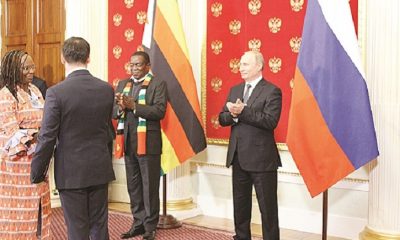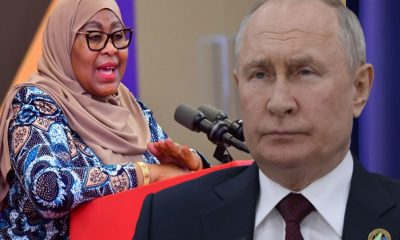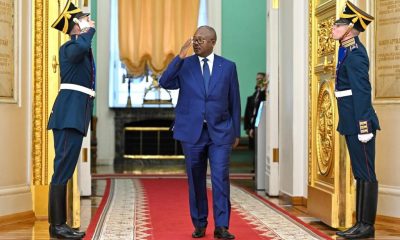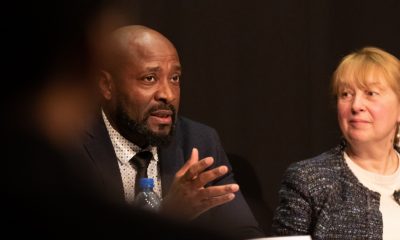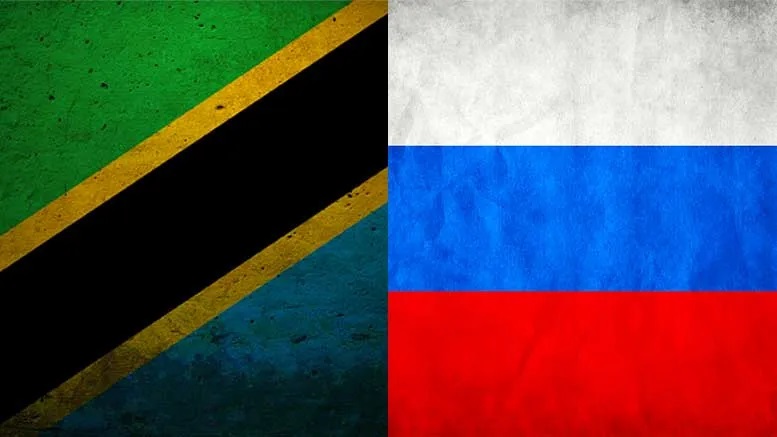World
Russia Developing Stronger Beneficial Cooperation with Zimbabwe—Matviyenko
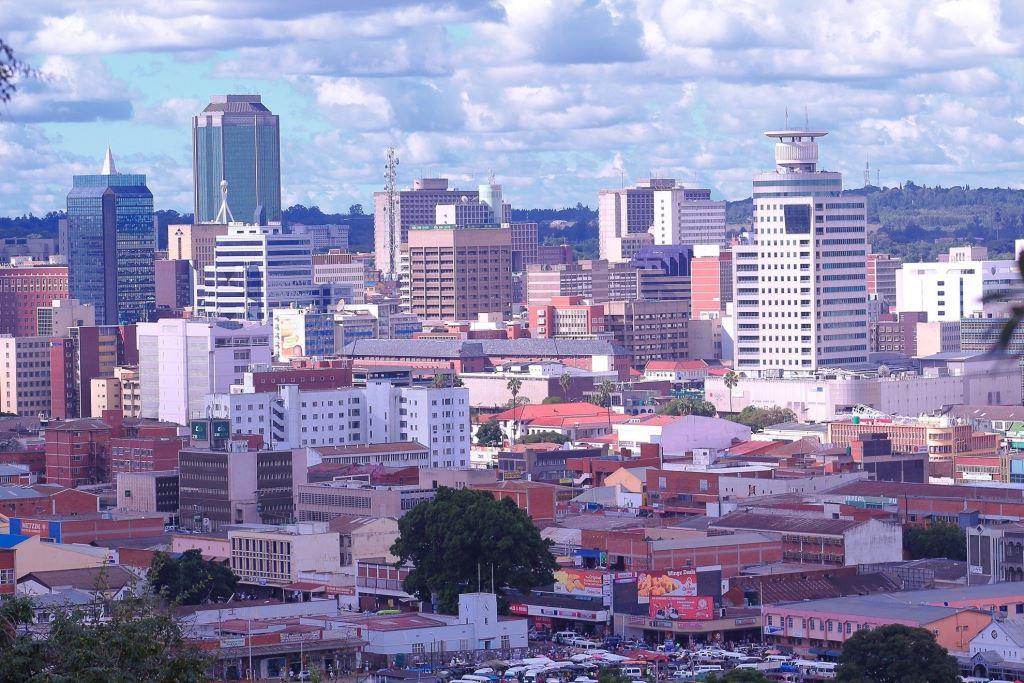
By Kester Kenn Klomegah
Russia and Zimbabwe continue to strengthen traditional ties after originating back in the period of the Zimbabwean people’s struggle for independence. All these years, the bilateral relations have continued to grow stronger and its further development cannot be under-estimated. Diplomatic relations between Zimbabwe and Russia clocked 40 years.
These are the historical facts the Chairwoman of the Federation Council, Valentina Matviyenko and President of the Republic of Zimbabwe Emmerson Dambudzo Mnangagwa acknowledged during their early June meeting in Harare, Zimbabwe.
Matviyenko headed a delegation of Russian senators to Mozambique and continued to Zimbabwe where the Russia-Ukraine crisis dominated the discussions as well as new substantive topics on regional and international issues. Outstanding bilateral questions and how to implement them were also raised.
Besides all the historical diplomatic niceties, Matviyenko informed Emmerson Mnangagwa that inter-parliamentary ties are developing dynamically, Russia and Zimbabwe had agreed on a memorandum of cooperation in the field of science, technology and innovation.
“I consider the practice of signing bilateral interdepartmental documents very useful, and it is necessary to open some of the aspects, as much as possible, in today’s difficult conditions, which is in the mutual state interests,” said the Chairwoman of the Federation Council.
On the Russia-Ukraine crisis that began on February 24, she noted the support that Zimbabwean colleagues provide to Russian foreign policy initiatives. “It is also important that Harare takes a balanced position in relation to the situation in Ukraine,” she said.
During the conversation, Matviyenko and Mnangagwa also discussed issues of expanding trade and economic ties between Russia and Zimbabwe.
“So far, the volume of mutual bilateral trade does not correspond to its potential.
“Therefore, the main task at this current stage is the creation of conditions for increasing the volume of trade and its diversification. Then, we proceed from the fact that the implementation of all these plans will be facilitated by joint fruitful work within the framework of the Intergovernmental Russian-Zimbabwean Commission on Economic, Trade, Scientific and Technical Cooperation,” explained Matviyenko.
Matviyenko and Mnangagwa, however, noted the Russia-Ukraine crisis worldwide, and issues related to food security.
Offering an assurance, she said: “Russia is ready to do everything possible to prevent a food crisis. We are ready to fulfil our contractual obligations in full. If Zimbabwe turns to Russia, we will work out a supply mechanism together and provide Zimbabwe with the necessary amount of food.”
With the Chairman of the National Assembly of the Republic of Zimbabwe Jacob Mudenda, the Chairwoman of the Federation Council stressed frequent interaction that gives a serious impetus not only to inter-parliamentary relations but to the entire range of Russia-Zimbabwean relations. According to her, both countries are actively interacting in the international arena based on compliance with international law and respect for the sovereignty of states.
Both reiterated the need to bring trade, economic and investment ties to a level that would correspond to political trusting relations. “We attach great importance to inter-parliamentary cooperation, which is designed to promote the implementation of agreements at the highest level, and we look forward to its further promotion,” she reiterated.
As Jacob Mudenda noted, mutual visits are very useful in terms of parliamentary diplomacy. According to him, the Zimbabwean parliament is working on legislative aspects in the field of expanding investment opportunities, speeding up the issuance of visas for foreign investors and reforming the tax regime for them.
Mudenda called on Russian companies and Russian entrepreneurs to expand cooperation with colleagues from Zimbabwe, in particular, in the field of agriculture, mining, and exploration of natural resources. He stated that the Zimbabwean colleagues would firmly support Russia on international parliamentary platforms.
During the meeting, Deputy Chairman of the Federation Council Konstantin Kosachev informed the Zimbabwean parliamentarians about the work of the Russian delegation at the meeting of the Assembly of the Inter-Parliamentary Union in Indonesia.
Co-Chairman of the Intergovernmental Russian-Zimbabwean Commission on Economic, Trade, Scientific and Technical Cooperation, Minister of Natural Resources and Ecology of the Russian Federation Alexander Kozlov informed about the results of the fourth meeting of the Intergovernmental Commission held the day before in Harare.
Zarubezhgeologiya, the operation of the international projects of Russian state company Rosgeo, might be brought in to work on the geological mapping of Zimbabwe, Russia’s Natural Resources Ministry said after a session of the Russia-Zimbabwe intergovernmental commission.
“In the course of meetings on the sidelines of the session, (Natural Resources Minister) Alexander Kozlov proposed to Zimbabwe’s Mining Development Minister Winston Chitando to engage Russian company Zarubezhgeologiya in work in the area of geological mapping. Zimbabwean colleague supported the idea and noted that the experience of Russian experts could be used in the creation of a joint geological digital database that has not been updated since the 1970s.
There was a raft of documents signed. Russian Prime Minister Mikhail Mishustin has signed decrees regarding memorandums on cooperation with Zimbabwe over diamonds and platinum group metals, according to documents published by the official internet portal of legislative information.
Besides that, Zimbabwe has asked Russia for larger supplies of agricultural products and for deliveries of petroleum products, Alexander Kozlov said after a fourth meeting of the Russian-Zimbabwean Intergovernmental Commission in Harare.
“The government of Zimbabwe has proposed to increase the volumes of wheat and vegetable oil supplies and start deliveries of petroleum products,” Kozlov said. Therefore, it was suggested that the Zimbabwean agriculture and energy ministries draft a specific request that would indicate the number of additional deliveries and the logistical chains, he said.
The share of agrarian products in Russia’s exports has been growing in recent years, mainly due to wheat and mineral fertilizers, Kozlov said. According to the Union of Grain Exporters, Russia supplied 11,900 tonnes of wheat to Zimbabwe in 2021 up from 810 tonnes in 2019.
In conversation with the Russian-Zimbabwean inter-parliamentary groups, Chairwoman of the Senate of the Republic of Zimbabwe Mabel Chinomona and Speaker Matviyenko exchanged views on a wide range of Russia-Zimbabwean inter-parliamentary cooperation and further noting that at the current stage, there is a stable and trusting political dialogue established between the two parties.
Russia and Zimbabwe are successfully interacting in the international arena on the basis of closeness or identity of positions on topical international and regional problems. “For its part, Russia has always supported Zimbabwe in the struggle to strengthen national sovereignty, defending its right to an independent course of development,” both agreed with this view.
They highly appreciated the existing opportunities for intensifying Russia-Zimbabwean inter-parliamentary relations. “One of the tools could be the conclusion of a Cooperation Agreement between the Federation Council and the Senate of the Republic of Zimbabwe. On the basis of this document, Matviyenko and Mabel Chinomona suggested could jointly implement a kind of what they termed “parliamentary patronage” in the development of contacts between the business circles – providing the necessary assistance in their activities.
There was then a proposal to sign an inter-parliamentary agreement outlining the priorities of the Russia-Zimbabwean agenda as the continuation of consistent work to develop the legal framework for bilateral relations, for instance, the possibility of broad cooperation in the field of healthcare, education and the humanitarian field.
The Chairwoman of the Federation Council supported the idea of the Zimbabwean side to install a monument dedicated to the Victory in the Great Patriotic War of 1941-1945 on the territory of the African Liberation Museum being created in Harare.
Deputy Minister of Science and Education of the Russian Federation Natalya Bocharova briefed the Zimbabwean parliamentarians on Russian initiatives in the field of humanitarian cooperation.
Valentina Matvienko and Mabel Chinomona took part in the signing ceremony of the Memorandum of Understanding between the Ministry of Science and Higher Education of the Russian Federation and the Ministry of Higher Education, Science and Technology Development of the Republic of Zimbabwe on cooperation in the field of scientific, scientific, technical and innovative activities. Matvienko finally stressed that Russia is interested in developing mutually beneficial cooperation with the countries of the African continent, and added that “This is one of the foreign policy priorities of the Russian Federation.”
According to the Russian Ministry of Foreign Affairs, Russia-Zimbabwean interaction is based on strong ties of friendship and cooperation, which developed during the struggle of the people for independence, and which continue to develop today. Zimbabwe is one of the 16-member Southern African Development Community.
World
African Visual Art is Distinguished by Colour Expression, Dynamic Form—Kalalb

By Kestér Kenn Klomegâh
In this insightful interview, Natali Kalalb, founder of NAtali KAlalb Art Gallery, discusses her practical experiences of handling Africa’s contemporary arts, her professional journey into the creative industry and entrepreneurship, and also strategies of building cultural partnership as a foundation for Russian-African bilateral relations. Here are the interview excerpts:
Given your experience working with Africa, particularly in promoting contemporary art, how would you assess its impact on Russian-African relations?
Interestingly, my professional journey in Africa began with the work “Afroprima.” It depicted a dark-skinned ballerina, combining African dance and the Russian academic ballet tradition. This painting became a symbol of cultural synthesis—not opposition, but dialogue.
Contemporary African art is rapidly strengthening its place in the world. By 2017, the market was growing so rapidly that Sotheby launched its first separate African auction, bringing together 100 lots from 60 artists from 14 foreign countries, including Algeria, Ghana, Mali, Nigeria, Senegal, and others. That same year during the Autumn season, Louis Vuitton Foundation in Paris hosted a major exhibition dedicated to African art. According to Artnet, sales of contemporary African artists reached $40 million by 2021, a 434% increase in just two years. Today, Sotheby holds African auctions twice a year, and in October 2023, they raised $2.8 million.
In Russia, this process manifests itself through cultural dialogue: exhibitions, studios, and educational initiatives create a space of trust and mutual respect, shaping the understanding of contemporary African art at the local level.
Do you think geopolitical changes are affecting your professional work? What prompted you to create an African art studio?
The international context certainly influences cultural processes. However, my decision to work with African themes was not situational. I was drawn to the expressiveness of African visual language—colour, rhythm, and plastic energy. This theme is practically not represented systematically and professionally in the Russian art scene.
The creation of the studio was a step toward establishing a sustainable platform for cultural exchange and artistic dialogue, where the works of African artists are perceived as a full-fledged part of the global cultural process, rather than an exotic one.
To what extent does African art influence Russian perceptions?
Contemporary African art is gradually changing the perception of the continent. While previously viewed superficially or stereotypically, today viewers are confronted with the depth of artistic expression and the intellectual and aesthetic level of contemporary artists.
Portraits are particularly impactful: they allow us to see not just an abstract image of a “continent,” but a concrete personality, character, and inner dignity. Global market growth data and regular auctions create additional trust in African contemporary art and contribute to its perception as a mature and valuable movement.
Does African art reflect lifestyle and fashion? How does it differ from Russian art?
African art, in my opinion, is at its peak in everyday culture—textiles, ornamentation, bodily movement, rhythm. It interacts organically with fashion, music, interior design, and the urban environment. The Russian artistic tradition is historically more academic and philosophical. African visual art is distinguished by greater colour expression and dynamic form. Nevertheless, both cultures are united by a profound symbolic and spiritual component.
What feedback do you receive on social media?
Audience reactions are generally constructive and engaging. Viewers ask questions about cultural codes, symbolism, and the choice of subjects. The digital environment allows for a diversity of opinions, but a conscious interest and a willingness to engage in cultural dialogue are emerging.
What are the key challenges and achievements of recent years?
Key challenges:
- Limited expert base on African contemporary art in Russia;
- Need for systematic educational outreach;
- Overcoming the perception of African art as exclusively decorative or ethnic.
Key achievements:
- Building a sustainable audience;
- Implementing exhibition and studio projects;
- Strengthening professional cultural interaction and trust in African
contemporary art as a serious artistic movement.
What are your future prospects in the context of cultural diplomacy?
Looking forward, I see the development of joint exhibitions, educational programs, and creative residencies. Cultural diplomacy is a long-term process based on respect and professionalism. If an artistic image is capable of uniting different cultural traditions in a single visual space, it becomes a tool for mutual understanding.
World
Ukraine Reveals Identities of Nigerians Killed Fighting for Russia

By Adedapo Adesanya
The Ukrainian Defence Intelligence (UDI) has identified two Nigerian men, Mr Hamzat Kazeem Kolawole and Mr Mbah Stephen Udoka, allegedly killed while fighting as Russian mercenaries in the war between the two countries ongoing since February 2022.
The development comes after Russia denied knowledge of Nigerians being recruited to fight on the frontlines.
Earlier this week, the Russian Ambassador to Nigeria, Mr Andrey Podyolyshev, said in Abuja that he was not aware of any government-backed programme to recruit Nigerians to fight in the war in Ukraine.
He said if at all such activity existed, it is not connected with the Russian state.
However, in a statement on Thursday, the Ukrainian Defence released photographs of Nigerians killed while defending Russia.
“In the Luhansk region, military intelligence operatives discovered the bodies of two citizens of the Federal Republic of Nigeria — Hamzat Kazeen Kolawole (03.04.1983) and Mbah Stephen Udoka (07.01.1988),” the statement read.
According to the statement, both men served in the 423rd Guards Motor Rifle Regiment (military unit 91701) of the 4th Guards Kantemirovskaya Tank Division of the armed forces of the Russian Federation.
UDI said that they signed contracts with the Russian Army in the second half of 2025 – the deceased Mr Kolawole on August 29 and Mr Udoka on September 28.
“Udoka received no training whatsoever — just five days later, on October 3, he was assigned to the unit and sent to the temporarily occupied territories of Ukraine,” the report read.
It added that no training records for Mr Kolawole have been preserved; however, it is highly likely that he also received no military training, but his wife and three children remain in Nigeria.
Both Nigerians, the report added, were killed in late November during an attempt to storm Ukrainian positions in the Luhansk region.
“They never engaged in a firefight — the mercenaries were eliminated by a drone strike,” UDI stated, warning foreign citizens against travelling to the Russian Federation or taking up any work on the territory of the “aggressor state”.
“A trip to Russia is a real risk of being forced into a suicide assault unit and, ultimately, rotting in Ukrainian soil,” the statement read.
In an investigation earlier this month, CNN reported that hundreds of African men have been enticed to fight for Russia in Ukraine with the promise of civilian jobs and high salaries. However, the media organisation uncovered that they are being deceived or sent to the front lines with little combat training.
CNN said it reviewed hundreds of chats on messaging apps, military contracts, visas, flights and hotel bookings, as well as gathering first-hand accounts from African fighters in Ukraine, to understand just how Russia entices African men to bolster its ranks.
World
Today’s Generation of Entrepreneurs Value Flexibility, Autonomy—McNeal-Weary

By Kestér Kenn Klomegâh
The Young African Leaders Initiative (YALI) is the United States’ signature step to invest in the next generation of African leaders. Since its establishment in 2010 by Obama administration, YALI has offered diverse opportunities, including academic training in leadership, governance skills, organizational development and entrepreneurship, and has connected with thousands of young leaders across Africa. This United States’ policy collaboration benefits both America and Africa by creating stronger partnerships, enhancing mutual prosperity, and ensuring a more stable environment.
In our conversation, Tonya McNeal-Weary, Managing Director at IBS Global Consulting, Inc., Global Headquarters in Detroit, Michigan, has endeavored to discuss, thoroughly, today’s generation of entrepreneurs and also building partnerships as a foundation for driving positive change and innovation in the global marketplace. Here are the excerpts of her conversation:
How would you describe today’s generation of entrepreneurs?
I would describe today’s generation of entrepreneurs as having a digital-first mindset and a fundamental belief that business success and social impact can coexist. Unlike the entrepreneurs before them, they’ve grown up with the internet as a given, enabling them to build global businesses from their laptops and think beyond geographic constraints from day one. They value flexibility and autonomy, often rejecting traditional corporate ladders in favor of building something meaningful on their own terms, even if it means embracing uncertainty and financial risk that previous generations might have avoided.
And those representing the Young African Leaders Initiative, who attended your webinar presentation late January 2026?
The entrepreneurs representing the Young African Leaders Initiative are redefining entrepreneurship on the continent by leveraging their unique perspectives, cultural heritage, and experiences. Their ability to innovate within local contexts while connecting to global opportunities exemplifies how the new wave of entrepreneurs is not confined by geography or conventional expectations.
What were the main issues that formed your ‘lecture’ with them, Young African Leaders Initiative?
The main issues that formed my lecture for the Young African Leaders Initiative were driven by understanding the importance of building successful partnerships when expanding into the United States or any foreign market. During my lecture, I emphasized that forming strategic alliances can help entrepreneurs navigate unfamiliar business environments, access new resources, and foster long-term growth. By understanding how to establish strong and effective partnerships, emerging leaders can position their businesses for sustainable success in global markets. I also discussed the critical factors that contribute to successful partnerships, such as establishing clear communication channels, aligning on shared goals, and cultivating trust between all parties involved. Entrepreneurs must be proactive in seeking out partners who complement their strengths and fill gaps in expertise or resources. It is equally important to conduct thorough due diligence to ensure that potential collaborators share similar values and ethical standards. Ultimately, the seminar aimed to empower YALI entrepreneurs with practical insights and actionable strategies for forging meaningful connections across borders. Building successful partnerships is not only a pathway to business growth but also a foundation for driving positive change and innovation in the global marketplace.
What makes a ‘leader’ today, particularly, in the context of the emerging global business architecture?
In my opinion, a leader in today’s emerging global business architecture must navigate complexity and ambiguity with a fundamentally different skill set than what was previously required. Where traditional leadership emphasized command-and-control and singular vision, contemporary leaders succeed through adaptive thinking and collaborative influence across decentralized networks. Furthermore, emotional intelligence has evolved from a soft skill to a strategic imperative. Today, the effective modern leader must possess deep cross-cultural intelligence, understanding that global business is no longer about exporting one model worldwide but about genuinely integrating diverse perspectives and adapting to local contexts while maintaining coherent values.
Does multinational culture play in its (leadership) formation?
I believe multinational culture plays a profound and arguably essential role in forming the kind of leadership required in today’s global business environment. Leaders who have lived, worked, or deeply engaged across multiple cultural contexts develop a cognitive flexibility that’s difficult to replicate through reading or training alone. More importantly, multinational exposure tends to dismantle the unconscious certainty that one’s own way of doing things is inherently “normal” or “best.” Leaders shaped in multicultural environments often develop a productive discomfort with absolutes; they become more adept at asking questions, seeking input, and recognizing blind spots. This humility and curiosity become strategic assets when building global teams, entering new markets, or navigating geopolitical complexity. However, it’s worth noting that multinational experience alone doesn’t automatically create great leaders. What matters is the depth and quality of cross-cultural engagement, not just the passport stamps. The formation of global leadership is less about where someone has been and more about whether they’ve developed the capacity to see beyond their own cultural lens and genuinely value differences as a source of insight rather than merely tolerating them as an obstacle to overcome.
In the context of heightening geopolitical situation, and with Africa, what would you say, in terms of, people-to-people interaction?
People-to-people interaction is critically important in the African business context, particularly as geopolitical competition intensifies on the continent. In this crowded and often transactional landscape, the depth and authenticity of human relationships can determine whether a business venture succeeds or fails. I spoke on this during my presentation. When business leaders take the time for face-to-face meetings, invest in understanding local priorities rather than imposing external agendas, and build relationships beyond the immediate transaction, they signal a different kind of partnership. The heightened geopolitical situation actually makes this human dimension more vital, not less. As competition increases and narratives clash about whose model of development is best, the businesses and nations that succeed in Africa will likely be those that invest in relationships characterized by reciprocity, respect, and long-term commitment rather than those pursuing quick wins.
How important is it for creating public perception and approach to today’s business?
Interaction between individuals is crucial for shaping public perception, as it influences views in ways that formal communications cannot. We live in a society where word-of-mouth, community networks, and social trust areincredibly important. As a result, a business leader’s behavior in personal interactions, their respect for local customs, their willingness to listen, and their follow-through on commitments have a far-reaching impact that extends well beyond the immediate meeting. The geopolitical dimension amplifies this importance because African nations now have choices. They’re no longer dependent on any single partner and can compare approaches to business.
From the above discussions, how would you describe global business in relation to Africa? Is it directed at creating diverse import dependency?
While it would be too simplistic to say global business is uniformly directed at creating import dependency, the structural patterns that have emerged often produce exactly that outcome, whether by design or as a consequence of how global capital seeks returns. Global financial institutions and trade agreements have historically encouraged African nations to focus on their “comparative advantages” in primary commodities rather than industrial development. The critical question is whether global business can engage with Africa in ways that build productive capacity, transfer technology, develop local talent, and enable countries to manufacture for themselves and for export—or whether the economic incentives and power irregularities make this structurally unlikely without deliberate policy intervention.
-

 Feature/OPED6 years ago
Feature/OPED6 years agoDavos was Different this year
-
Travel/Tourism10 years ago
Lagos Seals Western Lodge Hotel In Ikorodu
-

 Showbiz3 years ago
Showbiz3 years agoEstranged Lover Releases Videos of Empress Njamah Bathing
-

 Banking8 years ago
Banking8 years agoSort Codes of GTBank Branches in Nigeria
-

 Economy3 years ago
Economy3 years agoSubsidy Removal: CNG at N130 Per Litre Cheaper Than Petrol—IPMAN
-

 Banking3 years ago
Banking3 years agoSort Codes of UBA Branches in Nigeria
-

 Banking3 years ago
Banking3 years agoFirst Bank Announces Planned Downtime
-

 Sports3 years ago
Sports3 years agoHighest Paid Nigerian Footballer – How Much Do Nigerian Footballers Earn


